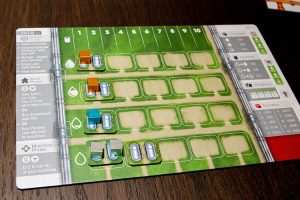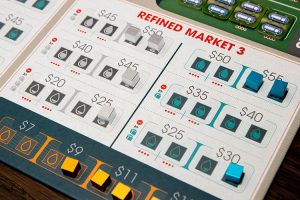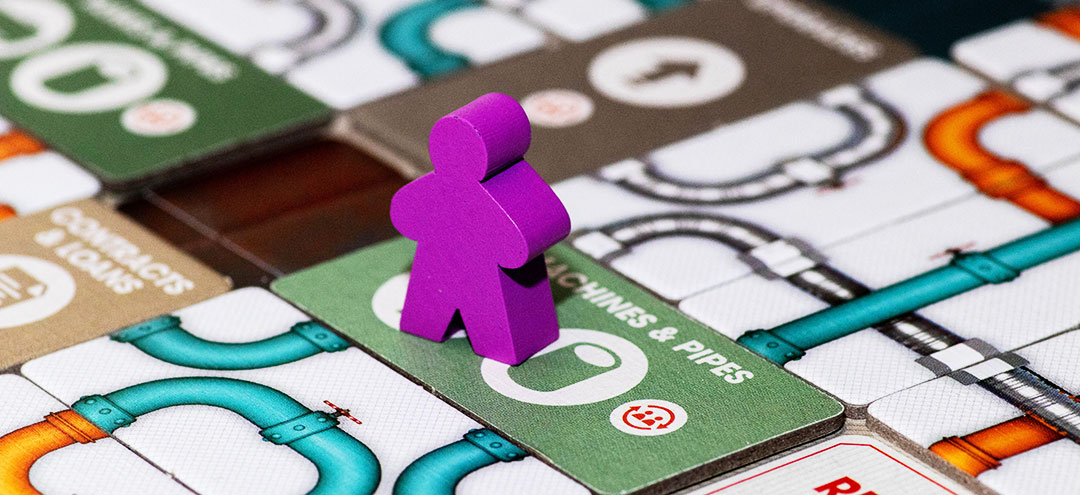 We are only halfway through, but 2019 is shaping up to be one of the better years for new board game releases in recent memory. Today we are looking at one of the games that is leading that charge, Pipeline, which sold out at Origins 2019 and finished atop the BGG hotness at the convention.
We are only halfway through, but 2019 is shaping up to be one of the better years for new board game releases in recent memory. Today we are looking at one of the games that is leading that charge, Pipeline, which sold out at Origins 2019 and finished atop the BGG hotness at the convention.
Pipeline has players starting up their own oil refinery business as the government moves toward privatization. You’ll have to manage your limited actions effectively to create the most wealth for your company over three years.
Pipeline is an economic euro for 2-4 players and plays in about 30 minutes per player. It plays well at all counts.
Gameplay Overview:
In Pipeline, you’ll compete against other players to purchase, refine, and sell oil. Each player will build their own personal network of pipes of three different varieties, each which can refine a certain type of oil. Once refined, that oil can be used to fill contracts, deliver orders, or sell back to the common refined market.
The game plays out over three years, each with a different number of actions. In year one everyone gets 8 actions; 6 in year two; and 4 in the final year. After those 18 quick actions, the game comes to an end and players add up their current cash, leftover oil, and some end-of-game valuations to determine the winner.

While everyone gets a single worker, it would be a mistake to call Pipeline a worker placement game. You’ll never block other players and you can continue to take the same action if you wish. It only serves as an indicator of the action you’ve selected. You’ll use this worker to take one of the available actions. Those on the main board include:
- Buy/sell at the oil markets—This makes up four of the available actions as there are three different refined markets and a crude oil market.
- Contracts and Loans—Grab a contract that can be filled immediately (or later) and/or take a $15 loan that comes with a penalty at game end.
- Tanks and Pipes—Buy additional tanks for oil storage and/or pipes from the shop.
- Machines and Pipes—Buy machines to run your pipeline automatically and/or pipes from the shop.
- Upgrades—Purchase upgrades that will give you additional abilities or immediate rewards.
Each market has one of the other main actions next to it and for the low cost of $10 you can take a market action and the neighboring action as well.
There are also a couple of actions related to the pipe tiles:
- Government Pipes—Buy up to 5 government pipes from the central board.
- Run your pipe network—Refine oil based on the length of the pipe and the type of oil you have on hand.
In general, the flow of the game revolves around buying crude oil, running it through your network to increase its value, and then selling it. But there are lots of options for when, and how, to get rid of your oil. Each type of oil will need to go through a specific length of pipe to upgrade from crude to low-grade, low-grade to mid, and mid-grade to high. It’s possible to do multiple steps at once if your pipe network is robust enough.

Your refined oil doesn’t necessarily have to be sold back to the market either, you can use it to fill orders or contracts. Orders are essentially a race to see who can complete the requirements the fastest and, once filled, are no longer available. Contracts, on the other hand, can be filled every year but often pay less than just selling directly to the market. However, you won’t have to compete against other players once you claim the contract and don’t have to waste actions going back to the market to sell. Be careful though, if you don’t fill a contract by the end of the year, you’ll earn a penalty and lose the contract.
After the end of year 3, players will get money based on both the oil they have left and the length of the pipes in their network. There are also four valuation cards in play each game that will be scored. These valuations may give you additional money for orders, contracts, certain types of oil in your tanks, or based on the types of pipes in your network. You’ll need to pay close attention to these each game as they are a major source of money at the end.
Players then lose money based on any penalties they took from loans or unfulfilled contracts and whoever has the most money left is the winner.

Game Experience:
While it makes a lot of sense to call Pipeline an economic game (there are four different markets, after all) it is really an exercise in managing your actions and being as efficient as possible. You’ll certainly have to compete with other players to buy early, when materials are cheapest and sell quickly, when they are worth the most. But rather than being entirely focused on market manipulation it’s more of a puzzle about when and where to take your actions.
Early on you’ll barely be scraping by with a few bucks to your name. The idea of spending $10 to take an additional action or $20 on a machine that costs $15 each turn to run seems like a—pipe dream? Ideally, you’ll be able to build up a network and some additional tanks and be able to turn a corner somewhere near the middle of the game where you can start taking advantage of all the options that are available to you.

The pipeline building is its own kind of spatial puzzle, as you’ll likely start by focusing on a certain color of pipe but need to have options if the market for that type of oil becomes flooded. Not to mention, having the ability to upgrade different types of oil gives you a lot of flexibility in actions as you can buy and sell different types of oil at different markets.
Everything in Pipeline comes down to trying to really decide how much your time is worth. You only have 18 actions. You can gain some extra efficiency by filling contracts, so you don’t have to take time to go to the market to deliver, but you’ll take on additional risk. Or you can try to meet the very specific demands of the public orders, but other players might beat you to them. Each refined market only buys two types of refined oil and it sells crude of the other type. So, if you can buy crude from the market you are delivering to that can certainly be advantageous, but you may have to pay more than you would at the crude market.
There is quite a lot of depth here in and each of your 18 actions gives you a lot to consider. What is most impressive is that, rule wise, Pipeline is quite simple. The entire rulebook covers 12 heavily-illustrated pages. Once you understand the game, teaching other players can be accomplished in less than 10 minutes. The depth comes from the interactions and mechanisms rather than lots of rules complexity and exception cases.

Not that I love every rule. Upgrades in Pipeline present an option for players to purchase an ability that will give them a benefit over the course of the game. There are five different sets of upgrades and you can buy up to two for $20 each. After you are done purchasing you can also close off one of the upgrades you didn’t purchase, just to prevent others from taking it. While Pipeline has a fair amount of player interaction, this bit felt a little tacked on and purely mechanical rather than making much sense thematically. It does increase the importance of turn order throughout the game, which some actions allow you to manipulate, but overall I think it makes upgrades altogether less attractive as you’ll struggle to get to the highest level upgrades when players can just cut you off without sacrificing much.
This whole time you will be keeping the end game valuations in mind. These can vary wildly from game to game. Sometimes they will line up to all be somewhat related and score a huge amount of points at the end. Other times you really must pick a focus because it’s impossible to succeed at all the valuations. The variety here reminds me a lot of how meetings work in Kanban—there are ways you can earn money in the game outside of valuations, but they inform how you go about everything else you are doing.
Final Thoughts:
Pipeline is definitely one of my favorite games of this year and will have a spot on my mid-weight euro shelf for years to come. It’s a lovely puzzle of making the most of your actions with just the right amount of player interaction (which the exception of that whole upgrade thing.)
The valuation cards in Pipeline give every game its own flavor and the combinations are close enough to endless that I think it will be difficult, if not impossible, to ever come to a point where you can define “the best” strategy.
Final Score: 4.5 Stars – A great mid-weight euro with a huge amount to discover from game to game.
 Hits:
Hits:
• Lots of interesting decision space with minimal rules overhead.
• Markets keep players interacting with each other and involved in everyone’s actions.
• Valuations give each game its own feeling.
Misses:
• Upgrade system is a bit overly confrontational.
























how can you ignore the theme?
This was a grand review, thanks for writing:)